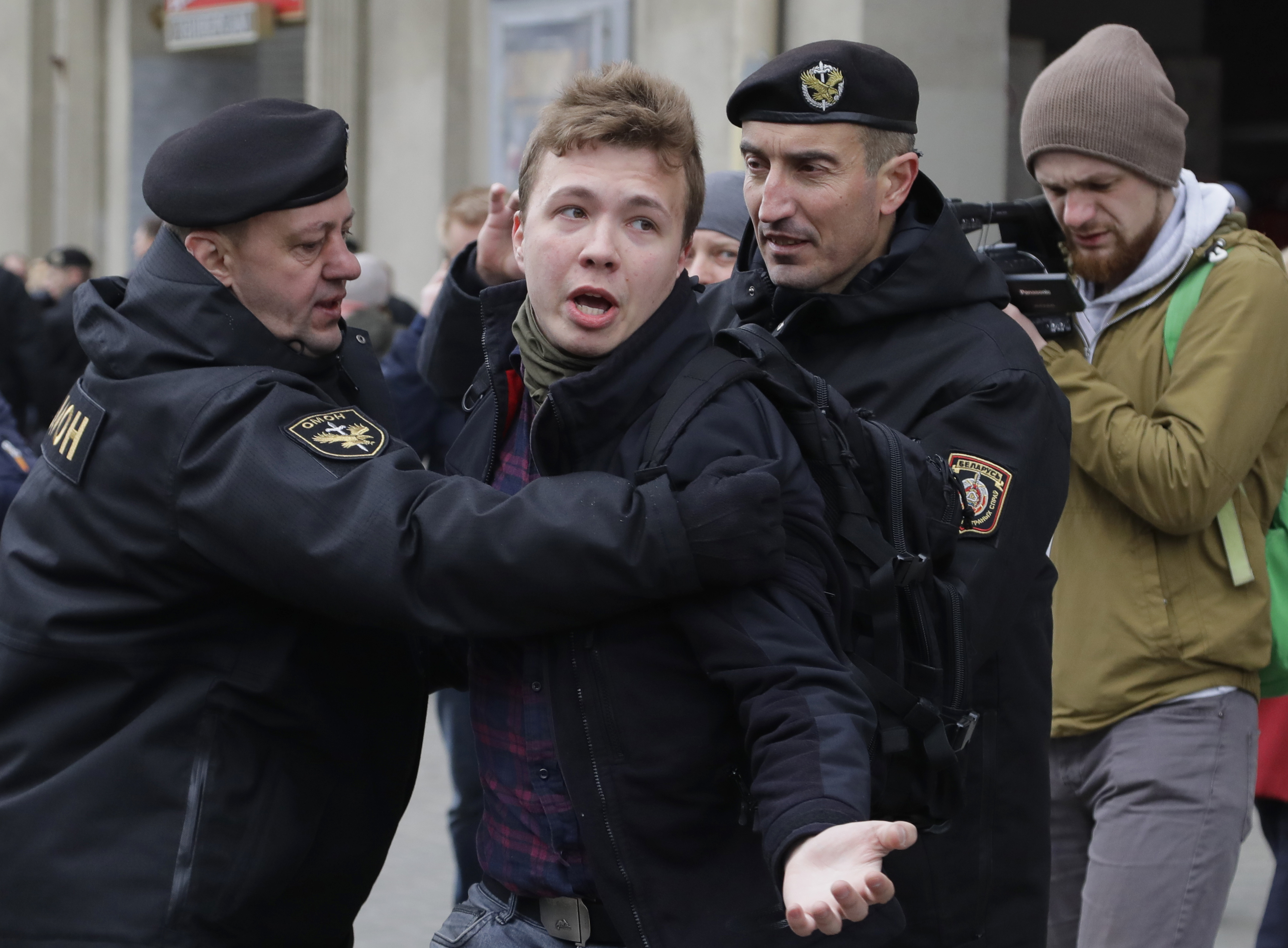Relatives, opposition leader believe detained Belarusian journalist was forced to make video confession


A free daily email with the biggest news stories of the day – and the best features from TheWeek.com
You are now subscribed
Your newsletter sign-up was successful
Dzmitry Protasevich says it's clear that his son, Belarusian dissident journalist Roman Protasevich, was coerced by authorities into making a video where he admits to organizing "mass riots."
"It's not his words, it's not the intonation of speech, he is acting very reserved, and you can see he is nervous," Dzmitry Protasevich told Reuters on Tuesday. "My son cannot admit to creating the mass disorders, because he just didn't do any such thing."
On Sunday, Roman Protasevich, 26, was on a Ryanair flight from Greece to Lithuania when Belarus' authoritarian president, Alexander Lukashenko, ordered a fighter jet to escort the plane to the Minsk airport. Once on the ground, Protasevich was arrested. He is the co-founder of an opposition news outlet, and last year was placed on Belarus' list of terrorists, accused of inciting hatred and mass disorder.
The Week
Escape your echo chamber. Get the facts behind the news, plus analysis from multiple perspectives.

Sign up for The Week's Free Newsletters
From our morning news briefing to a weekly Good News Newsletter, get the best of The Week delivered directly to your inbox.
From our morning news briefing to a weekly Good News Newsletter, get the best of The Week delivered directly to your inbox.
In a 29-second video released Monday and posted to social media channels allied with Lukashenko, Protasevich said authorities were treating him "as correctly as possible" and he wasn't experiencing any health issues. It looked like there were bruises and abrasions on Protasevich's face, and he appeared to be reading from a script. His father told Reuters it looked like Protasevich's nose had been broken, "because the shape of it is changed."
Amnesty International spokesman Alexander Artemyev told The Washington Post it looked like Protasevich had possibly been subjected to "torture or other ill-treatment." Lukashenko is often referred to as "Europe's last dictator," and Belarusian authorities have been accused of intimidating political prisoners into making forced confessions. After watching the video of Protasevich, Belarusian opposition leader Svetlana Tikhanovskaya said there was "no doubt" he had been tortured and was "under pressure."
A second video was released on Tuesday night, this time showing Protasevich's girlfriend, Sofia Sapega, who was detained with him on Sunday. In this clip, Sapega states that she is behind a Telegram channel that released the personal information of law enforcement officers.
A free daily email with the biggest news stories of the day – and the best features from TheWeek.com
Catherine Garcia has worked as a senior writer at The Week since 2014. Her writing and reporting have appeared in Entertainment Weekly, The New York Times, Wirecutter, NBC News and "The Book of Jezebel," among others. She's a graduate of the University of Redlands and the Columbia University Graduate School of Journalism.
-
 Political cartoons for February 16
Political cartoons for February 16Cartoons Monday’s political cartoons include President's Day, a valentine from the Epstein files, and more
-
 Regent Hong Kong: a tranquil haven with a prime waterfront spot
Regent Hong Kong: a tranquil haven with a prime waterfront spotThe Week Recommends The trendy hotel recently underwent an extensive two-year revamp
-
 The problem with diagnosing profound autism
The problem with diagnosing profound autismThe Explainer Experts are reconsidering the idea of autism as a spectrum, which could impact diagnoses and policy making for the condition
-
 Key Bangladesh election returns old guard to power
Key Bangladesh election returns old guard to powerSpeed Read The Bangladesh Nationalist Party claimed a decisive victory
-
 Epstein files topple law CEO, roil UK government
Epstein files topple law CEO, roil UK governmentSpeed Read Peter Mandelson, Britain’s former ambassador to the US, is caught up in the scandal
-
 Iran and US prepare to meet after skirmishes
Iran and US prepare to meet after skirmishesSpeed Read The incident comes amid heightened tensions in the Middle East
-
 EU and India clinch trade pact amid US tariff war
EU and India clinch trade pact amid US tariff warSpeed Read The agreement will slash tariffs on most goods over the next decade
-
 Israel retrieves final hostage’s body from Gaza
Israel retrieves final hostage’s body from GazaSpeed Read The 24-year-old police officer was killed during the initial Hamas attack
-
 China’s Xi targets top general in growing purge
China’s Xi targets top general in growing purgeSpeed Read Zhang Youxia is being investigated over ‘grave violations’ of the law
-
 Panama and Canada are negotiating over a crucial copper mine
Panama and Canada are negotiating over a crucial copper mineIn the Spotlight Panama is set to make a final decision on the mine this summer
-
 Why Greenland’s natural resources are nearly impossible to mine
Why Greenland’s natural resources are nearly impossible to mineThe Explainer The country’s natural landscape makes the task extremely difficult
